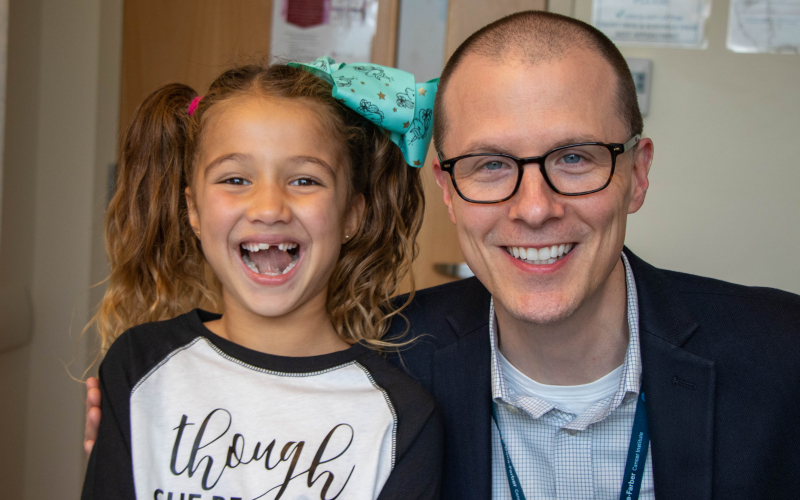
Lakelynn with her doctor, Steven Dubois, MD. Dr. Dubois is leading a clinical trial for children with NTRK fusion positive cancer.
By: Trish Adkins
When 6-year-old Lakelynn was diagnosed with a rare sarcoma wrapped around the nerves in her arm, doctors told her mom, Leslie, that there was nothing they could do. The tumor’s location made surgery impossible and radiation dangerous.
For a short time, there was no hope. But then genetic testing revealed that Lakelynn's tumor harbored the NTRK gene fusion.
A doctor who was reviewing Lakelynn’s case knew of an open clinical trial at Dana-Farber Cancer Institute in Boston. The trial was specifically for children with the same genetic mutation that made Lakelynn’s untreatable tumor with conventional cancer treatments.
“No parent ever wants to put their child on a clinical trial, but when a clinical trial is the only option for your child, you have no choice,” said Leslie, Lakelynn's mom.
Lakelynn entered the Phase 1 clinical trial — and continues on the trial today. Her tumor shrank and remains stable.
Often children enter clinical trials after frontline treatment has failed. Sometimes, a child with an extremely rare cancer like Lakelynn’s or a currently incurable cancer, like DIPG, may enter a clinical trial before attempting another standard treatment.
However, finding open clinical trials can be a challenge for families. Similarly, doctors struggle to find patients to fill trial slots. To help families find the life-saving treatment they need, Alex’s Lemonade Stand Foundation (ALSF) launched the Clinical Trials Navigation program, a one-of-a-kind resource that conducts personalized searches and provides a list of pediatric oncology clinical trial options for families and oncologists to consider.
Here’s how Clinical Trial Navigation works:
- Parents or members of the oncology medical team can request service. The service is free and can provide a list of open studies that cover supportive care, interventional treatment or even survivorship support.
- To request a Clinical Trials Search, fill out the form available on the ALSF website.
- After receiving the request, ALSF’s Clinical Trial Navigator will follow up with a brief consultation to verify the information that will be used for the search.
- Then, the Navigator will conduct a detailed search of trials that meet the patient’s needs and contact trial sites to ensure enrollment is active.
- All final search results are sent along to the patient’s family for consideration, along with tools and tips for making the enrollment process as seamless as possible.
- Along the way, the Clinical Trial Navigator is available to answer questions and provide support.
The Clinical Trial Navigator can also provide additional referrals for related ALSF family services including travel assistance through the Travel For Care program, emotional support for siblings through SuperSibs and other resources. Families and physicians can access the Clinical Trial Navigator here.

